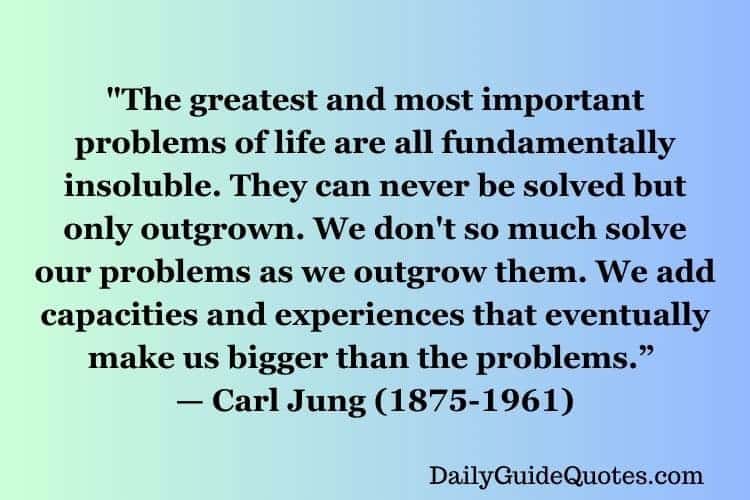
A swiss psychiatrist and psychoanalyst who founded analytical psychology, Carl Jung is one of the most well known psychologists of our time.
This quote is not to suggest that there should be no conscious actions taken while attempting to tackle the major problems of life. It alludes more to the idea of while living our daily lives we shouldn’t be stopping to check the tires with every little bump in the road.
By needing to get complete closure with every problem we experience, we can develop an obsessive-compulsive personality disorder which is characterized by orderliness, perfectionism, and excessive devotion to work, to the point that individuals begin forcing answers. The individual is often not allowing any problems to remain unsolved before moving on with life, and when things do not work out in their favor, they can quickly become angry.
The following advice taken from the paragraphs in his work “Alchemical Studies” provide some very specific ways to support the psyche as it works to outgrow a problem. Jung suggests, for example, that we can:
- accept the new thing that spontaneously arises and welcome its help: take a positive attitude to what comes up in dreams and fantasies, even if these seem to go “against deeply rooted instincts;” be open to insights from the unconscious
- go with the “stream of time:” avoid trying to drive, force or make things happen; develop patience, in the knowledge that the psyche has its own timetable (and this is almost always much slower than the ego would like)
- maintain a balanced life in the world: there is no need to become totally absorbed in what’s going on in the inner life; Jung was adamant that the demands of outer life and our roles in the world have great value (aside from providing paychecks and regular routines) in keeping us grounded in reality.
- give some time in waking life to useful activities, so as to keep the left brain/conscious mind occupied and lessen its fretting.
- “let things happen:” try to adopt a different attitude about living, one more open to and accepting of the irrational.
- take Meister Eckhart’s advice and “let go of oneself:” relax into the realization that the ego cannot control the process of psychological growth.
- accept the “reversal of one’s nature:” our growth often occurs via contact with the inferior function and the orientation opposite to our usual type, so for Extraverts, there can arise some “new thing” from within, while for Introverts, it might be encountered out in the world; likewise, Thinking types may experience a feeling, while Feeling types might become intrigued with an idea and do research about it.
- hold on to values that are true to one’s nature: while superficial values associated with the persona may fall away those that are genuinely part of us become like roots that can help to hold us in place, so we don’t waver or fall into an enantiodromia; we need stability as we move through the growth phase.
- appreciate the value of fantasies: our culture tends to dismiss fantasy, imagination, and intuitions, but these are key components of the psyche at work.
The greatest and most important problems of life are all fundamentally insoluble. They can never be solved but only outgrown. We don’t so much solve our problems as we outgrow them.
Carl Jung
At times during the process of inner growth, consciousness can develop a “cramp,” and in such intervals, creative activities become one of the best ways to get the conscious mind to relax. Others may advise meditation as a way to relax and let go. Once the conscious relaxes, we can let things happen and the results show up in a variety of ways, e.g. “an enlargement, a heightening and enrichment of the personality,…”; and/or new attitudes about ourselves, about life, about the problem we had. Generally they would no longer seem to be an issue or concern. If they are however, there are methods to mindfulness that will create solutions.
Citations:
(1) M, Sue. “Outgrowing the Important Problems of Life.” Jungian Center for the Spiritual Sciences, 18 Sept. 2015, jungiancenter.org/outgrowing-the-important-problems-of-life/.
(2) Purrington, Author: Mr., et al. “Carl Jung on “Problems of Life’ – Anthology.” Carl Jung Depth Psychology, 13 Dec. 2019, carljungdepthpsychologysite.blog/2020/01/12/carl-jung-on-problems-of-life-anthology/.
Recent Quotes
Some people love comfort other than others. I look at going to the gym as a comparison. Some people can handle the pain better than others. While one person sweats furiously to get that last set in,...
Everybody wants to be happy. As a kid growing up I imagined different careers and paths in my future, and the ones that appealed to me most were the ones I thought would make me happy. My Mom and...
